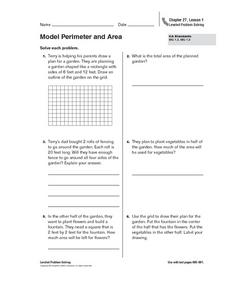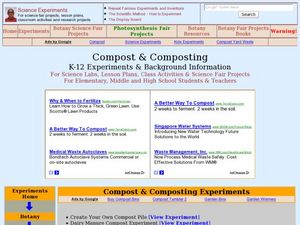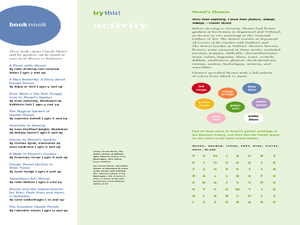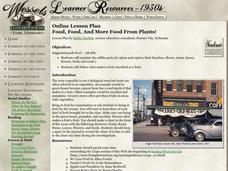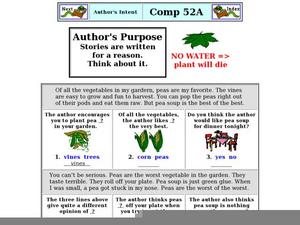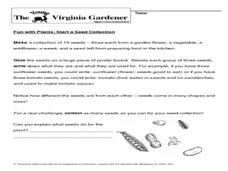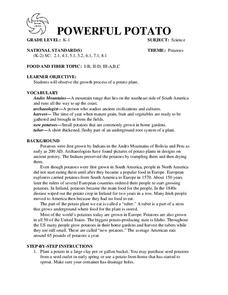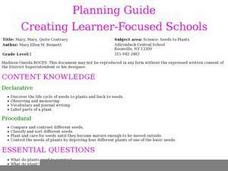Curated OER
Mystery Caterpillar Challenge and IPM or Organic Gardening Practices
For this caterpillar worksheet, students look at the picture of the caterpillar and identify what kind it is. Students then decide how to take care of it.
Houghton Mifflin Harcourt
Model Perimeter and Area
Gardens seem to be the go-to for area and perimeter word problems. In this assignment, gardening consultants advise Terry, who is helping his parents plan for planting. They draw the outline of a garden on a grid and then perform...
Curated OER
Compost and Composting Experiments
Students investigate the composting process through a variety of experiments. In this ecology lesson, students discuss the benefits of composting. They examine how compost affect plant growth.
Curated OER
NGA Kids Inside Scoop Spring 2007
Students become familiar with the work of Claude Monet and his garden paintings. For this Monet lesson, students compare the garden works of Claude Monet. Students examine pictures for the colors in his paintings. Students...
Curated OER
Mulch
Students conduct a series of experiments on mulching. In this earth science lesson, students discuss the benefits of mulching on soil. They explore how different types of mulch affect plant growth.
Curated OER
A GROWING MARKET
Students reasearch and grow a plant and present findings. They are told that bedding plant is the name for young plants grown. Students choose one plant to research and they use their worksheet to create an information sheet explaining...
Curated OER
Desert Xeriscaping
Students recognize native species of desert vegetation while examining the need for water conservation. They design and create a xeriscape landscape using a variety of materials.
Curated OER
Food, Food, And More Food From Plants!
Students examine the edible parts of a plant and explore their function. They define what makes a fruit classified as a fruit. They create a sketch or map or photo of a 1930s farm and justify their plant selections.
Curated OER
Flower Pot Salad Bar
Students discuss the connection between a flower pot and wholesome food by creating a salad. For this healthy eating lesson, students utilize numerous fresh vegetables to create a classic salad in a flower pot. Students write...
Curated OER
LEAGUE: Into the Desert: Lesson 1
Students discover the human and physical characteristics of desert regions. In this regions lesson, students describe deserts around the world, discuss animals, vegetation, water conservation, and how humans can care for the land.
Curated OER
The Amazing Tomato
Students gain an understanding of where our food comes from. In this plant life lesson, students review what plants need for growth and how long it takes them to grow. Students research which plants it takes to make salsa. Students...
Curated OER
A Garden in the Mailbox
Students study seed catalogs to find information about plants and growing seasons. They write letters requesting a seed catalog after using online resources. They use them complete an associated worksheet and discuss zone maps for their...
Curated OER
Author's Intent
In this author's intent activity, students read two short stories about vegetables. Students answer 9 short answer questions about the author's intent or purpose.
Curated OER
Start A Seed Collection
In this start a seed collection worksheet, students collect, label and display 15 seeds 3 each from a garden flower, a vegetable, a wildflower, a weed and the kitchen, and observe the differences.
Curated OER
Lesson 3: Life Cycle of Brassica Plants
Students investigate the life cycle of brassica plants. In this science lesson, students observe each stage in the life cycle of their plant. Students record their observations and graph the data. Students
Curated OER
See How They Grow: Plants And Their Parts
Pupils discuss what plants require in order to grow, identify plant parts and their functions and discuss a video about plants. They conduct a controlled experiment with bean seeds and then record and observe the bean plants.
Curated OER
Let's Learn About Lettuce
Students learn more about lettuce. In this agriculture lesson, students listen to their instructor lecture about the history of lettuce. Students then participate in an activity that requires them to compare and contrast iceberg lettuce...
Curated OER
Lets Think About...Plants
Students bring in various vegetables and make friendship soup. They plant seeds and discuss the things plants need to grow and thrive.
Curated OER
Weeds on the Windowsill
Students study farming and reasons to control weeds. They examine pesticides necessary for the control of weeds and the damage to the environment. Through experimentation, students plant seeds in different soils and determine if seeds...
Curated OER
POWERFUL POTATO
Students will observe the growth process of a potato plant.Plant a potato in a large clay pot or gallon bucket. You may purchase seed potatoes
from a seed outlet in early spring or use a potato from home that has started to sprout. Make...
Curated OER
Science: Seeds to Plants
First graders compare and contrast different seeds before planting them. They assess the basic needs to plants and conduct experiments of deprivation of those needs. They write stories and draw pictures of plants which are bound into a...
Wild BC
Climate Change Bingo
Here is a 20-box bingo card to use when exploring ways that humans impact the environment. Various environmentally aware activities are listed in the boxes, and learners circulate the room to find someone who practices the different...
Gecko Mathematics
Gecko Mathematics: Multiplying Unit Fractions
Make learning visible! Have your mathematicians follow along as you use paper strips to demonstrate the concept of multiplying unit fractions. Then, offer a different way of solving the problem using a number line. Finally, introduce the...
EngageNY
Mid-Module Assessment Task: Grade 6 Math Module 4
Halfway through the module — the perfect time for an assessment. The 18th installment of a 36-part series is a mid-module assessment. Scholars provide evidence of understanding through various mathematical and contextual problems.



